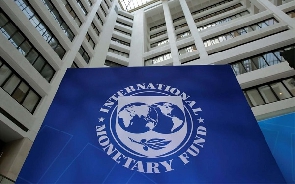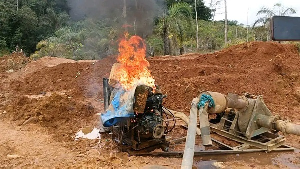Mr Zhu Jing, the Deputy Head of Mission, Embassy of China, has said it is important for Accra to collaborate with Beijing to present to combat to combat illegal mining (galamsey) with a common agenda.
He said the two countries must not allow the issue of illegal mining to damage their mutual warm relationship.
Mr Jing made the statement, on Monday, in Accra, during a Roundtable discussion on illegal mining, hosted by the Institute of Economic Affairs (IEA).
The Chinese Government, he said, respected and supported the Ghanaian Government in the efforts to solve the problem in accordance with laws and regulations.
Mr Jing said that his Government formally opposed any Chinese national engaging in illegal mining in Ghana.
"Today, I am here not for blaming but for some good understanding of illegal mining and its role in China - Ghana relations."
Illegal mining, he said, was not the full picture of the China - Ghana relations.
The main stream of the China - Ghana relations was the win-win cooperation, he stated, adding, "China now is the biggest trading partner and also the main source of investment for Ghana".
The discussion dubbed: "The Galamsey Menace in Ghana: The Way Forward", was chaired by Nana Kobina Nketsia V, Omanhen of Essikado Traditional Area, in the Western Region.
It was attended by stakeholders in the mining industry, Members of Parliament, members of the Diplomatic Community, Civil Society Organisations, Academia and the public.
The panel members included Professor Sulemana Al-Hassan of the University of Mines and Technology (UMAT) and Mr Kenneth Ashigbey, Convener, Media Coalition Against Galamsey.
Mr Jing, however, noted that the root cause of illegal small-scale mining was in Ghana, likewise the solution.
He said the menace, which had a long history had caused a huge damage to the environment.
For centuries, he said, illegal mining had been curated with the livelihood of the Ghanaian people, while it formed a very complicated interest to lean on.
"So this is the fundamental reasons why this problem could not be solved after so many years," he noted.
Mr Jing said: "Since I started my posting in Ghana a few months ago, I have visited a few mining sites, although I did see any gold, you know. I was deeply shocked by the damage of illegal mining on the water and the soil."
"In my mind, illegal mining menace must be stopped through effective solution. We should up a window, while closing a door. Create more jobs for those miners and guide them to work legally and change their old way of life."
He said China's position on opposing illegal mining was very clear cut and had been very constant.
"The Chinese Government has dispatched several working groups to come to Ghana; different groups had their different aims, sometimes to persuade the local Chinese to go back to China, among other solutions," he stated.
"Our Embassy has also mobilised the Chinese community here in Ghana not to participate in illegal mining and we have issued many relevant cautionary reminders many times," he added.
He said currently due to joint efforts by China and Ghana, the number of the Chinese illegal miners had been declining and that many of them had already left Ghana.
"The key to solving the problem lies with Ghana, not China. Those Chinese illegal miners would not come all the way to Ghana without the facilitation, support and shelter from the local people," he said.
"We should punish not only the Chinese illegal miners but also their Ghanaian supporters behind."
Mr Jing said tracking down the Chinese illegal miners alone; while neglecting their supporters could not solve this complicated problem.
He said for the Chinese side was ready to cooperate with their Ghanaian side in solving illegal mining problems.
However, they were also facing some daunting challenges - one of which was the inadequate and incomplete legal foundation.
"Foreigners are exclusively prohibited to engage in small-scale mining, according to the Mineral and Mining Act 2006," he said.
"However, foreigners are allowed to provide mining support services to a holder of a mining right, according to Mineral and Mining Support Services Regulation, 2012."
Mr Jing said in practice it was very difficult to tell what was small scale mining from what was support services; adding that, "this leaves a huge loop hole for foreigners to engage in illegal mining".
He said the other challenge was the dilemma of environmental distraction and rehabilitation.
"The Chinese side is willing to stress on cooperation with the Ghanaian side over issues environmental degradation and provide relevant technical assistance.
“However, before we devote ourselves to environment governance, we should solve the problem of illegal mining; otherwise the efforts will lead to no where."
General News of Wednesday, 13 February 2019
Source: ghananewsagency.org













